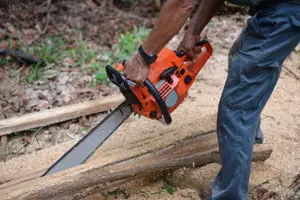Over One Million Dangerous Chainsaws Recalled
A faulty power switch has caused severe problems with chainsaws manufactured by Harbor Freight Tools. The Consumer Product Safety Commission (CPSC) reports that the chainsaw can continue to operate even after the switch has been turned off. These chainsaws were sold under three different names, and the recall applies to chainsaws sold under the brand names Portland, One Stop Gardens, and Chicago Electric.
Defective Chainsaws Cause Injuries to Consumers
According to the CPSC, the 14-inch electric chainsaws sold by Portland, One Stop Gardens, and Chicago Electric tend to remain in operation after the user has attempted to turn the machine off. This malfunction poses a severe risk of injuries to individuals using the chainsaws.
The recall came into effect on May 14, 2018, and the manufacturer, Harbor Freight Tools, has offered to replace any of the defective chainsaws with new ones.
Harbor Freight Tools says that they have been receiving reports about the chainsaws not turning off. So far, they say 15 consumers have contacted them to complain about the dangerous defect. In three cases, people have suffered lacerations as a result of the chainsaws not turning off. One of those injuries was considered hazardous and required the victim to get stitches in their arm.
Description of the Chainsaws Recalled
The Chainsaws sold under the brand names Portland and On Stop Gardens came in either green or black. These products both have “Portland” printed on their saw blades. Chainsaws sold under the brand name Chicago Electric came in either black or red. The blades of these saws were printed with the brand name “Chicago Electric.” All of the models came with black blade guards.
Two models are subject to the recall. The model numbers are 67255 and 61592. The model numbers are the same for all three brands. The model numbers can be located on the product label, which is on the bottom of the saws.
The saws retailed for around $50. They were sold online through Harbor Freight Tool’s company website, and at retail locations across the United States between May 2009 and February 2018.
This product was manufactured in China and was imported through California by Harbor Freight Tools.
What to do with the Defective Chainsaws
If you suspect that you might have purchased one of the defective chainsaws, look at the product number to determine if your chainsaw is, in fact, subject to the recall. If your chainsaw is one of the recalled models, do not use the product. You can return the chainsaw to the manufacturer. Replacements will be provided at no cost to all customers who purchased the malfunctioning products.
Product Liability: Companies are responsible for what they sell
When companies sell defective products to consumers, they can be held liable for their actions and can be required to provide compensation to those who were injured.
Any company or party involved in the design, manufacturing, assembling, wholesaling, or retailing the product can be found liable to the consumers. If the product was manufactured in component parts that were later assembled, the manufacturer of a component can be accountable too.
In order to have a claim for product liability, a plaintiff must be able to show that the defendant sold or made the defective product, the defendant was a commercial entity, the plaintiff was injured, the product was defective at the time it was sold to the plaintiff, and that the product’s defect was the cause of the plaintiff’s injury.
Defects can be the result of faulty design, a problem that occurred during manufacturing, or a problem in the marketing of the product. A “design defect” or design flaw occurred when the product was designed in a way that made it dangerous even when it was built as specified. If a car is designed to be top heavy, and frequently flips over, this would be a design defect.
A manufacturing defect happens when a product that would be safe if it was manufactured correctly becomes defective because it was not built correctly. If you bought a bike that fell apart because it was missing a bolt that was supposed to be there, but that was mistakenly not put in by the manufacturer, this would be a manufacturing error.
Marketing issues happen when a product is sold for a purpose it is not intended for, when the product’s instructions are not correct, or when the product presents risks and does not include appropriate warnings. This could be the case if a company sells a cleaning product that should not come in contact with a person’s skin but fails to have a clear warning on the packaging about that risk.
If a company sells a product, and someone is hurt because the product is defective, the injured person can seek compensation from the company for the injuries that they suffered.
Product Liability is often Strict Liability
When an offense is subject to strict liability, the plaintiff does not have to show that the defendant was negligent the company failed to exercise due care. This means that if the defect exists, and the defect caused an injury, the company is liable even if they can show that they exercised a great deal of caution in the design, manufacturing, and marketing of the product. This removes one obstacle for plaintiffs.
Effect of Recalls on Product Liability Claims
Companies often issue recalls for problems with their products. The fact that a person was injured by a product that was recalled does not necessarily mean that the company will be liable. Some recalls might be for minor issues that are not considered defects. At the same time, issuing a recall will not absolve a company of their liability. If a customer is injured by a recalled product, the customer might not have known of the recall, and the company might not have done enough to warn about the defect. If a company is told they should recall a product and does not, this can be used against the company in a courtroom.
The Statute of Limitations: Time limits on claims
Each state has their own statute of limitations on product liability claims. This means that if you delay too long in filing your claim, you could be barred from having your day in court, even if your claim is valid. It is essential to speak with an attorney if you think you might have a claim.
If you or a family member are injured because of a defective product, Parker Waichman LLP right away at 1-800-YOURLAWYER (1-800-968-7529) for a free consultation with one of our Harbor Freight Tools chainsaw injury lawsuit attorneys.





